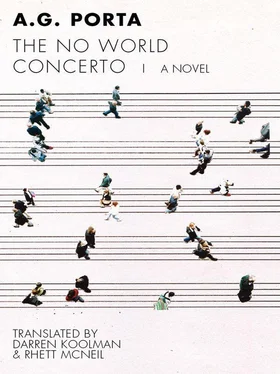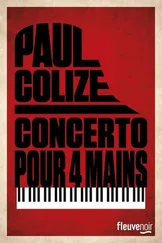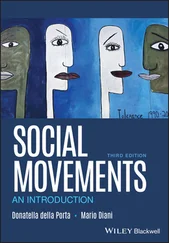Her skin, he thinks while caressing her arm, examining every fine blonde hair, delicate as down, looks so young in the light of the bedside lamp. Her delicate skin, he thinks while envisioning her in a tuxedo, or perhaps just wearing the jacket, double-breasted but unbuttoned, with a bowtie around her neck; her mother’s high-heel shoes, which are clearly too big for her, the only other item of clothing covering her naked body as she stands before him, aloof and domineering, despite being only a girl. Thus the screenwriter imagines her, repenting his decision to get rid of his camera equipment, not that he could realize his vision onstage in the little theater where they rehearse, let alone the church in which they’re going to perform their concerts. He caresses her delicate skin. What does No World mean? he asks her. She answers without blinking, without taking her eyes off the ceiling: it means a reality existing parallel to ours, a reality that’s essentially the same as ours, but seen through a different lens. A No World, she clarifies, exists in another dimension. The screenwriter wants to know if she still thinks about him. She usually gives a vague answer tending toward an affirmative, as if telling a white lie to conceal a dark truth, in order to protect his feelings, while he knows he’s playing the role of the jealous old fool to a T, a fool who can’t conceal his jealousy, who can’t prevent himself interrogating her, who can’t abide not knowing everything about her, because perhaps he feels his life with her is something of a miracle, and he needs her reassurance that it’s real, he needs her to tell him that she loves him. Just a little bit? he suggests to her. Even if it’s only a little bit, he hears himself whispering softly. Then silence. The two of them lie motionless on the sheets. She confesses that whenever she makes love to the young orchestra conductor, she thinks of him. A cold chill runs through his body. The girl doesn’t notice this reaction, although she knows the effect her words have on him, this old teacher who is waiting for the least gesture, even a hint of acquiescence on her part, any sense that she might be willing to run away with him, as far away as possible, to that new life which exists only in his mind; this old teacher who listens patiently to her paranoid ravings about the shadows that pursue her, and about her unhealthy obsession with writing; this old screenwriter who entertains her wild speculations about the nonexistence of the world — only a dream, she says, drifting in the immensity of space — a poor old man who listens to her every word, who only wants to hear her say she loves him, who asks her, intimidated, gently holding her hand, as she allows some seconds of doubt to pass, then tells him, in a deliberately irresolute tone, that she does, she loves him. Is this another white lie? he asks. No, she says, pausing to let in more doubt, it isn’t. The old man closes his eyes; she climbs out of the bed to get dressed; he responds by stretching out his hand, his eyes still closed, as if wanting a last touch of her skin, his arm — the stretch sustained for some seconds before failing, before falling on the sheets — reaching weakly after her. Will you come back? he asks her. I always do, she says, I’ve never stopped coming back. The conversation ends without her saying another word, not even good-bye; not slamming the door, closing it gently behind her, as he stays motionless, his eyes still closed, dreaming of her delicate skin, remembering her words, the sound of her voice. Then the usual fluttering in his stomach: he’s not sure if he can bear only having the memory of her. He repeats the question again and again, does she love him; will it be forever? He gets up and goes to the window. This time, he doesn’t look at the building opposite but at something down on the street, something that doesn’t exist as yet. There’s a man on a corner watching him from the shadows, trying to go unnoticed, but the screenwriter doesn’t see, his eyes clouded, searching for a girl in white, he doesn’t want to see anything unless it’s decked in white. He sits at his desk, whispers the words that cause him so much anguish, will you come back? tears welling up in his eyes, blearing all color and shape, as the whisper drifts over the blank page and typewriter, then out through the window, and into the immensity of space.
At night, the clack and plink of the typewriter punctures the silence of the room. The screenwriter fingers the keys, listening to the dull staccato rhythm. There’s a kind of silence, he writes, that is adorned by the sound of gentle breathing, the susurrus of two bodies ruffling the sheets, leaving their warm impressions on a bed. The screenwriter stops typing to look at the bed, to search for these impressions, for the recollection of how her skin felt, as if the sheets could preserve, even fossilize, every pore, every soft, downy follicle of hair, her blonde hair, which he wants to photograph, enlarge, and examine under a microscope. He removes his glasses, deftly cleans them with a handkerchief, and resumes his puttering on the keyboard. His writing is disjointed, haphazard, and perhaps, normally, he wouldn’t feel so inclined to write after having sex, but the élan within him impels him to keep going. The scene is set in the hotel with the English name. The screenwriter thinks about placing it at the start of the film. He can almost see it, the movie beginning, and the opening credits superimposed upon images of the hotel. A kind of prelude of sorts, to establish the mood and setting, the time period in which the story takes place, before introducing the girl and her mother. The viewer sees a group of porters completing the transfer of a grand piano from the service entrance to a large suite. These images are intercut with shots of the girl’s mother, dressed conservatively in a pantsuit and a pair of modest heels, instructing hotel employees to make space in the middle of a large living room. Seated to one side, and out of the way, an older man quietly watches the scene, perhaps in puzzlement at what’s going on around him. The girl, wearing white jeans, a white T-shirt, and white canvas sneakers with the laces removed, walks slowly behind the piano, which the porters are trundling down the hallway. Once it’s in place in the living room, the porters remove the protective padding. Their departure cues the older man, who stands up, leaves his jacket on the chair, and approaches the piano with a tuning key. The mother instructs the hotel employees to take her luggage to the car. There hasn’t been any dialogue yet; in fact, nothing more has been said than a word or a phrase to underscore the visuals. Starting now, the soundtrack will consist of discordant notes being pounded on the piano by the tuner, each note emphasized, to give the impression of something on the verge of becoming a melody, while mother and daughter say good-bye at the hotel’s entrance. It’s a procedure they’ve gone through dozens of times, having never had much to say to one another. This scene takes place before the one in which the father goes to see the girl in the little theater; perhaps a few days beforehand, and in the morning. The girl’s mother watches attentively as they deposit her bags in the trunk of her convertible. She then looks out at the traffic and notes that it seems to be picking up. As she climbs into the sports car, she says her daughter’s name, pronouncing it with a “ka.” Why would she pronounce it with a “ka”? Because the girl hears everyone pronounce it with a “ka” instead of a “k.” It’s a clue. Something so subtle she can’t share it with anyone else, because no one can understand it but her. Her mother looks at her over the rim of her sunglasses and tells her to stop talking nonsense. She then turns the ignition and looks in the rearview mirror, imprecates mildly at the traffic, and slowly pulls away, lifting her hand to wave good-bye as the car accelerates and mingles with the sea of other vehicles. “Ka” or “k”: is it so hard to tell the difference? The girl watches from the sidewalk until the convertible becomes indistinguishable, like a drop in the sea, and asks herself what could be so important that her mother had to go on another trip. Sometimes she says she goes searching for her missing cousin, Dedalus, as if, after all these years, finding him is still one of her chief concerns. While waiting for the elevator, the girl remembers his story. She’s never told anyone about him. She may have mentioned to some friends that her mother has a remarkable cousin, but she didn’t go into any details. If the brilliant composer knew his story, she muses, he’d probably dedicate one of his compositions to him. She could write a novel about him, a young man who went to the neighboring country’s capital years before, and was never heard from again. He fled to escape prosecution, she recalls. But after everything her mother’s told her, the girl believes the truth will never be known. His story features many deaths, a shooting, and even a femme fatale. The piano tuner corrects the instrument’s pitch, pounding on the keys, which emit a plangent sound, as if giving a mournfully slow rendition of the 5 Pieces for piano . A couple of novelists had already written about those unfortunate events, although the girl would’ve taken a different approach to them. In the elevator, she thinks she may be able to write her own version of his story some day, maybe as a sequel to the book she’s currently working on. But first she has to get that one written. She’s never believed her mother’s little jaunts indicated any sort of development in the cousin’s story; she simply leaves every time under the pretext of a search she’s never undertaken. The excuse is an old one for the girl, who’s certain her mother’s real motive for absconding has more to do with expensive clothes and lovers, and perhaps, if she can fit it in, a little business on the side. She’s never told anyone about him, but perhaps she’ll tell the young conductor and brilliant composer — who’ll probably dedicate one of his compositions to him. Back in the living room, the girl asks the piano tuner to adjust the hammers and pedals for a particular composition. She’s experimented in the past with prepared pianos, putting various objects into the strings to modify the timbre of the instrument. But it seems the man isn’t quite finished yet. It’s as though he is taking advantage of his duties as a tuner and performing his own plangent rendition of the 5 Pieces for piano . He’s taken long enough already, but he seems to want to make the process even slower, to let the music reverberate, to produce something unique, a sound that hasn’t been heard before, as a gift to all posterity, a message to be transmitted to the cosmos. The girl — his only audience — decides to leave him to his task and sits down to her diary. She writes that they pronounce her name with a “ka”; that this makes her feel odd; that she’s tried to figure out why they do it, but hasn’t gotten anywhere yet.
Читать дальше












